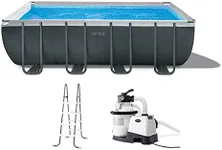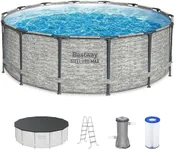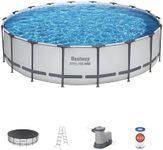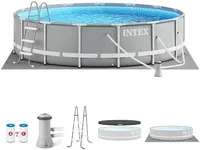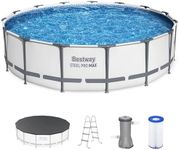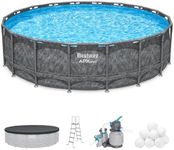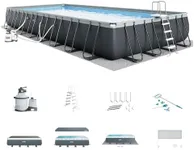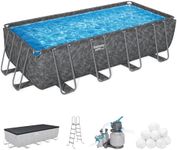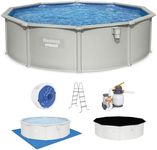Buying Guide for the Best Above Ground Swimming Pools
Choosing the right above-ground swimming pool can be a fun and rewarding experience. It's important to consider various factors to ensure you get a pool that fits your needs, space, and lifestyle. By understanding the key specifications and how they relate to your personal requirements, you can make an informed decision and enjoy your pool for years to come.SizeThe size of the pool is one of the most important factors to consider. It determines how many people can comfortably use the pool at the same time and how much space it will take up in your yard. Sizes can range from small pools suitable for a few children to large pools that can accommodate multiple adults. To choose the right size, consider the number of people who will use the pool regularly and the available space in your yard. Measure the area where you plan to place the pool and ensure there is enough room for the pool and any additional equipment or decking you might want to add.
ShapeAbove-ground pools come in various shapes, including round, oval, and rectangular. The shape can affect the pool's aesthetics, the ease of installation, and how you use the pool. Round pools are generally easier to install and maintain, while oval and rectangular pools provide more swimming space and are better for lap swimming. Consider how you plan to use the pool and the layout of your yard when choosing the shape. If you have a smaller yard, a round pool might be more suitable, while larger yards can accommodate oval or rectangular pools.
MaterialAbove-ground pools are typically made from materials like steel, resin, or aluminum. The material affects the pool's durability, maintenance requirements, and overall appearance. Steel pools are strong and durable but can be prone to rust. Resin pools are resistant to rust and corrosion and often have a more modern look. Aluminum pools are lightweight and resistant to rust but can be more expensive. Consider the climate in your area and how much maintenance you are willing to perform when choosing the material. If you live in a humid or coastal area, a rust-resistant material like resin or aluminum might be a better choice.
LinerThe pool liner is the inner layer that holds the water and provides a smooth surface for swimmers. Liners come in different thicknesses and patterns. Thicker liners are more durable and resistant to punctures, while thinner liners are more affordable but may need to be replaced more frequently. The pattern of the liner can also affect the pool's appearance. When choosing a liner, consider the level of activity in the pool and your aesthetic preferences. If you have children or plan to use the pool frequently, a thicker, more durable liner is a good investment.
Filtration SystemThe filtration system is crucial for keeping the pool water clean and safe to swim in. There are different types of filtration systems, including sand, cartridge, and diatomaceous earth (DE) filters. Sand filters are easy to maintain and effective for most pools. Cartridge filters provide better filtration and are easier to clean but may need to be replaced more often. DE filters offer the best filtration but require more maintenance. Consider the size of your pool and how much time you are willing to spend on maintenance when choosing a filtration system. A larger pool may benefit from a more efficient filtration system like a cartridge or DE filter.
InstallationThe ease of installation can vary depending on the type of pool and your level of DIY skills. Some pools come with detailed instructions and can be set up by homeowners, while others may require professional installation. Consider your comfort level with assembling large structures and whether you have the necessary tools and help. If you prefer a hassle-free experience, you might want to opt for a pool that includes professional installation or choose a simpler model that you can easily set up yourself.
AccessoriesAccessories can enhance your pool experience and include items like ladders, covers, and cleaning equipment. Some pools come with these accessories included, while others require you to purchase them separately. Consider what accessories are essential for your needs and whether they are included with the pool. For example, a ladder is necessary for safe entry and exit, and a cover can help keep the pool clean when not in use. Make a list of the accessories you need and check if they are part of the package or if you need to budget for them separately.

